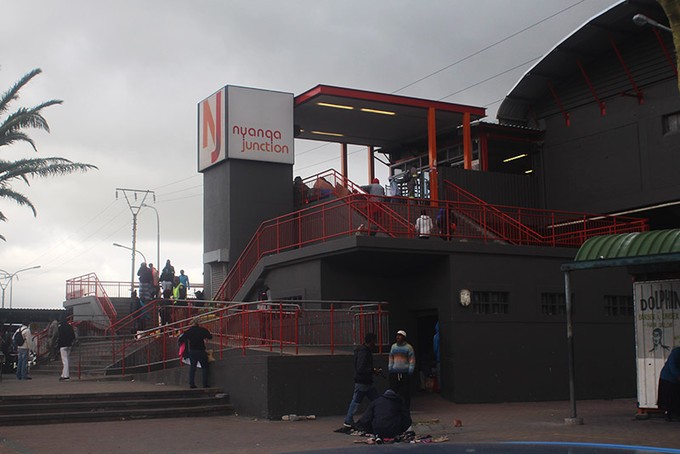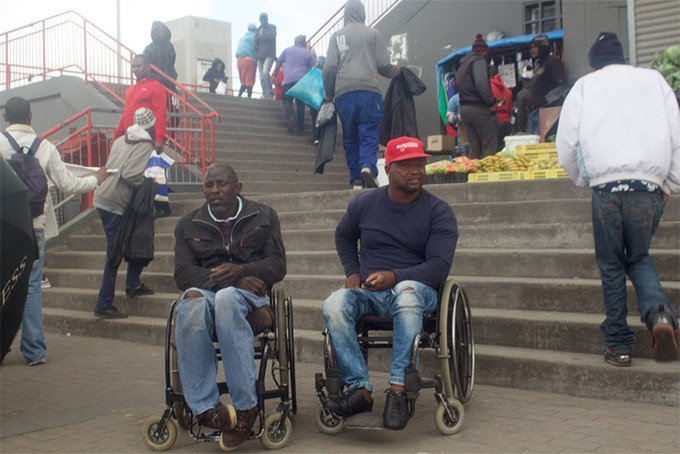Public transport is a nightmare for the disabled
“People treat us as if we chose to be in these wheelchairs”
For Nyanga residents James Soganga and Lunga Yawa, a simple journey to the city centre is a nightmare.
Both have been in wheelchairs for more than 20 years after being wounded during robberies in Nyanga.
Yawa, 43, says he has to hire someone to go with him if he wants to go somewhere on the train.
“Depending on who I get, I can pay up to R100 a day for someone to help me get on the train. I do not have that money everyday, so sometimes I just do not go,” said Yawa.
GroundUp accompanied the two men as they wheeled themselves down the road to Nyanga Junction station. They cannot use the pavement because it is too narrow.
At Nyanga Junction there are three steps, then a short ramp, then several dozen stairs to the top. The station has lifts but they do not work.

Yawa says he usually hires a passer-by for R10 or R20 to help carry him up the stairs without damaging his wheelchair. The hospital supplies a new wheelchair only every two years. He prefers to pay someone to help carry him up the stairs.
Then there is the battle to get into the train. Someone has to tip the wheelchair onto the train - if there is space.
“When the train is full, you wait - it does not matter how long it takes - for an empty one because there is no space for a wheelchair. People do not have the patience to wait for me to get in.”
Soganga, who mostly uses taxis as a form of transport, says he sometimes stands for hours trying to get a taxi to stop.
“They will pass you because they see you are in a wheelchair. If you are lucky and one stops, they do not have the patience to wait for you. The driver shouts at you, not understanding how difficult it is to get into a taxi without any help.”
“Even the passengers do not want to help. They complain about the wheelchair, saying it makes them dirty,” said Soganga.
“People treat us as if we chose to be in these wheelchairs. As if we wouldn’t want to be able to catch taxis on our own without help.”
He says in a taxi he has to pay for two people because his wheelchair takes up a second seat. He says catching “amaphela” (“cockroach” taxis or private taxis) is much better than catching a minibus taxi because the vehicle can accommodate the wheelchair.
The City of Cape Town offers a Dial-a-Ride service for the disabled, which must be booked in advance. But Soganga says he cannot depend on the service which is often fully booked “and never comes on time”.
He tells of his experience when he and five other disabled people had an appointment in Mowbray for a learnership.
They stopped a taxi and were told by the driver they had to put their wheelchairs on their laps.
“He dropped us at the taxi rank and said he would not drop us where we were going because it is not on the taxi route. We were wearing white shirts but by the time we got to the place our shirts were so dirty from pushing ourselves.”
“We can’t all afford cars but does that mean we shouldn’t be able to do the things we want to do because we are disabled? Our homes do not accommodate us and we try to get away from that. The public system does not accommodate us.,” said Soganga.
He says even when he goes buy groceries for himself he has to hire ‘Iphela” for R250 to take him to the nearest mall. The trip in a minibus taxi costs R20 return.
Both Soganga and Yawa say transport is an obstacle to their enrolment in learnerships.
“We have no jobs and the learnerships gave us something to do, gave us some hope of having a better future. But we have had to turn down all those that require us to use public transport, because it is a struggle,” says Yawa.
The learnerships provide transport money but it runs out very fast because the two have to hire special transport, he says.
Metro rail spokesperson Riana Scott says the company has acknowledged that the rail commuter system is not yet fully accessible to people with disability.
“Universal accessibility is one of Passenger Rail Agency of South Africa’s (Prasa) acknowledged priorities. A universal access policy inclusive of design, norms, standards and guidelines is virtually complete. Prasa’s new trains will take account of special needs of passengers,” said Scott.
Support independent journalism
Donate using Payfast

Next: Traders at Cape Town station deck demand better security and lower rents
Previous: In photos: Violence at Vaal University of Technology
© 2016 GroundUp. 
This article is licensed under a Creative Commons Attribution-NoDerivatives 4.0 International License.
You may republish this article, so long as you credit the authors and GroundUp, and do not change the text. Please include a link back to the original article.

